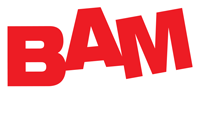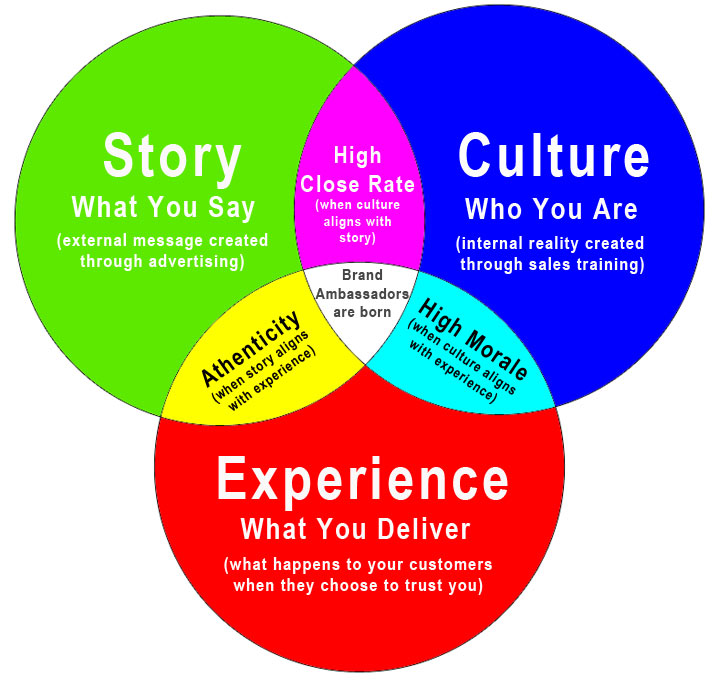This post is meant for our clients, and certainly not for their competitors. It’s about your story (the one we tell in your advertising.) It’s about you company’s culture. And it’s about the customer experience you deliver.
Here at BAM, we’ve always preached that greatness is achieved when there’s an alignment of the planets. Story, Culture and Experience are the planets. When any one (or gasp, two) are out of alignment, the planets all go spinning off into various parts of the solar system.
Important note… notice who’s at the axis of these three planets. It’s NOT your company. IT’S YOUR CUSTOMERS! If you build out a company and try to get it to “self-orbit”, it will crash and burn. BUT… if you push it into a nice orbit around your customers, your success is virtually assured.
In this article by our friend Roy Williams (aka The Wizard of Ads) we see how important proper alignment of these three “planets” can be, and what wonderful things that can happen when they are properly aligned.
Does Your Staff Live Your Advertising?
I’ve always been puzzled by the fact that businesspeople think of advertising and sales training and customer service as three separate departments within a company.
Have you ever developed an impression of a company through their advertising and then gotten a totally different impression of that company when you met them?
The external personality of your company is created through your ads. This is what’s perceived by the general public.
The internal personality of your company is created by management. This is what your customers encounter when they contact you.
If you delegate the creation of your advertising to an outside group but give them no input into your sales training and customer service programs, you’ll create a company with a split personality every time.
Are people in your company using those words and phrases created and popularized by your ad writers? Or do they start an altogether new and different conversation with your customer full of new and different words and phrases?
That’s a really bad idea.
Continue the conversation that was begun in your ads and you’ll see your close rate rise significantly.
Each of us has a natural connection with 3 of every 10 people we meet. Another 3 aren’t going to like you regardless of what you do or say. This disconnection isn’t your fault, so don’t let it bother you. The remaining 4 people can possibly be sold, but only if you do and say the right things.
Does it surprise you that when all categories of selling are combined, the national average close rate is about 20 percent?
Let’s say your staff is well above average with a close rate of 30 percent. This means they’re selling 3 out of 10 opportunities. That’s 50% more than the 2 out of 10 everyone else is selling.
Even so, what if we could sell just 1 of the 4 remaining “sellable” customers?
Your sales would immediately increase by 33%.
What if we could sell 2 of those 4?
Your sales would increase by 67 percent.
What if, through clear focus and genuine inspiration, we could sell 3 of those 4? Congratulations. We just doubled your sales volume with no change in pricing, no change in inventory, no change in overhead and – most importantly – no additional sales opportunities.
The corporate wall between ad writing and sales training has troubled me for 30 years, but I’ve not spoken publicly about the problem until now.
Shall I confess?
I didn’t mention it because I didn’t want to be asked to fix it.
Fixing it, you see, would involve talking to the employees of all the companies for whom I write ads. And frankly, nothing on earth could be as excruciating for me as having to smile and listen to well-meaning people tell me what they think I should do differently.
Truth be told, I’m not really a people person. Few writers are.
But a few months ago it occurred to me: I don’t have to have those conversations myself. I have dozens of partners and thousands of students who are much better with people than I am.
One of my partners, Tim Miles, has written extensively in recent months about how to keep your company from becoming schizophrenic. And Tim is a real people person. Bestselling authors Jeffrey and Bryan Eisenberg have addressed the problem in a new “executive storyteller’s guide” that’s scheduled to be released next month. The Fortune 500 companies that were given advance copies and implemented the advice have responded with enthusiastic reviews. Another partner, Ray Seggern, has put together a marvelous workshop to help you repair the split in your corporate personality.
According to Seggern,
1. Story is What You Say (external message created through advertising)
2. Culture is Who You Are (internal reality created by sales training)
3. Experience is What You Deliver (what happens to your customers when they choose to trust you)
If any of these 3 is out of alignment, there will be predictable side effects.
When story and experience don’t align, you get bad reviews. But when your advertising aligns with your customer’s experience, you have authenticity.
When culture and experience don’t align, you have cancer in the building. But when your corporate culture aligns with your customer’s experience, you have employees with high morale.
When culture and story don’t align, you have a close rate that’s unimpressive. Get your sales training aligned with your advertising and you’ll need a wheelbarrow to carry your money.
2015 is going to be a very good year for business.

